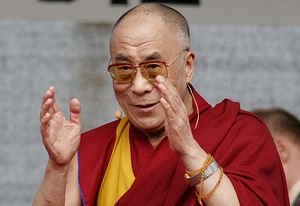Although you might not have noticed, the Hong Kong protests weren’t the only China news coming out this week. For your weekend reading, here’s a round-up of non-Hong Kong related links:
According to a report from Agence France-Presse, expanded on by the South China Morning Post, the Dalai Lama is “informally” discussing the possibility of a trip to China. The Dalai Lama said that he has told contacts in China (including retired officials) that he would like to take a pilgrimage to Mount Wutai, a mountain in Shanxi province that is sacred to Buddhists. “It is not finalized, not yet, but the idea is there,” the religious leader said from Dharamsala, India. The Dalai Lama also noted that the deputy party secretary in Tibet had mentioned “the possibility of my visit as a pilgrimage to that sacred place,” news my colleague Clint wrote last week.
But take these reports with a grain of salt, as the South China Morning Post recommends. SCMP talked to Lian Xiangmin, a research fellow at the China Tibetology Research Center, who was not optimistic about the pilgrimage taking shape. “I think the Dalai Lama is going to attract attention in the international community by indicating informal talks with Beijing over his desire to make a pilgrimage,” Lian said. “I don’t see any sign that Beijing will make any changes on its stance towards Tibet and the Dalai Lama.”
Wednesday, October 1 was China’s National Day. In celebration of the 65th anniversary of the founding of the People’s Republic of China, President Xi Jinping gave a speech praising China’s past and outlining its future. Among the highlights: Xi’s comments on the Chinese Communist Party. As is customary, Xi insisted that only the CCP can lead China to a prosperous future. However, he also warned that the Party itself needs reform to ensure the support of China’s people. “All problems that affect the Party’s creativity, cohesiveness and effectiveness must be addressed, all illnesses that harm the Party’s advanced nature and purity completely cured and all tumors grown on the healthy organism of the Party removed,” Xi said.
In other news, the Wall Street Journal takes a look at why Russian President Vladimir Putin is so popular in China. To many Chinese, Putin is a charismatic leader who has the will-power to stand up to the nefarious West — which makes him something of a role model for China’s own leaders. Writing for The Diplomat, David Gitter explored the Chinese love for Putin (and its effect on Chinese foreign policy) back in August. Yang Hengjun looked at the similarities between Putin and Xi earlier this summer as well.
In remarks made at the Council on Foreign Relations, U.S. Deputy Defense Secretary Robert Work said that the U.S. would respond militarily to any attempt to take the disputed Senkaku/Diaoyu Islands by force. “While the Senkakus are under Japanese control, Article 5 applies, and we would respond if there was an attempt to take the Senkakus,” he said, according to Defense News. Work was referring to Article 5 of the U.S.-Japan security treaty, which requires the U.S. to respond to “an armed attack … in the territories under the administration of Japan.” China argues that the U.S., by promising to defend Japan in the event of a conflict, is emboldening Tokyo to make provocative moves in the territorial dispute.
Finally, according to the U.S. State Department, Taiwan is officially part of the “global coalition to degrade and defeat ISIL,” also known as Islamic State. As the Washington Post notes, so far Taiwan’s support has been limited to the verbal, with Taiwan’s Ministry of Foreign Affairs promising to “monitor the threat to global security” and “cooperate closely with the international community to provide humanitarian aid to the victims of ISIL attacks.” China has made similar promises to provide humanitarian aid and support the global fight against terror, but is not included as part of the coalition as defined by the U.S. State Department.

































